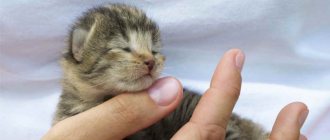What are they afraid of?
Why does such a problem appear before the birth of a child: cats and newborn children. There are several reasons :
- possible allergy to cat fur; according to statistics, this pathology occurs quite rarely, but if such a situation arises, the animal can always be isolated;
- a cat can become a spreader of infection, but only if it lives both at home and outside.
© shutterstock
The last one is very significant. There is a common belief that cats should be allowed outside. But this is not so, because this is a domestic animal for which the territory that it controls is important, in this case, this is the area of the apartment or house. Side factors that encourage a cat to go outside can easily be overcome: by sterilization, at least of the cat, and drug intervention (sedative drops) for the cat.
This procedure is completely painless for a cat, and for a person’s conscience it is absolutely calm, since, having taken an animal to live in a house, we are obliged to fulfill some formalities, otherwise it is better not to take responsibility for the animal.
If we can’t arrange a cat’s life, then why are we trying to have a child? Communication between a cat and a newborn is inevitable after the baby appears in the house. These creatures are very curious, and having become members of the family, they are also jealous, so you need to prepare your pet for the arrival of a new resident of the house.
Children and cats
Why do we get cats? Very rarely, a cat appears in the house spontaneously and unexpectedly. More often than not, this decision is conscious, even hard-won. Future cat owners meticulously choose the breed, buy cat accessories and food in advance, argue about the name and plan to spend time teaching the cat hygiene and order.
Even if a cat appears in the house suddenly, psychologists believe that it satisfies the needs of the owners that arose long before the appearance of the purring furry creature:
- need for support - every person wants to feel support from time to time, and we do not always receive it from loved ones, even the most loving and attentive; the very presence of a cat nearby creates a feeling of silent support, complicity, involvement;
- the need for play - many adults have lost the habit of playing and have forgotten how to play, but have not stopped loving it at all; sometimes we still, like a child, want to fool around, but the cat gives us a reason and an “adult” justification - for its health it needs movement and play;
- need for communication - the cat is wordless, uncritical, listens and hears (even understands), without interrupting or criticizing, without making comments, without asking questions, it helps us feel listened to and heard.
There is a stereotype that cats are owned by balanced, calm, even often a little lazy and sedentary people who love to sleep. Why lazy? Because they don't want to walk the dog twice a day or clean the aquarium once a week. According to scientific research, cats are loved by independent, determined, purposeful women who do not deny their feminine essence and remain feminine and sensual. According to statistics, cats are often owned by single or childless women - a cat allows them to realize their maternal instincts and replaces children and loved ones. Among men, cats are preferred by bachelors, who are also self-sufficient and independent, not striving for marriage - they associate themselves with a cat that “walks on its own.”
However, these are often just stereotypes. Any of us can have a cat in the house not of our own free will, but by yielding to the requests of a child or loved one. And soon we adapt to the presence of a cat in the house, find a common language with it and become typical “cat people.”
The experience of generations and numerous studies by scientists around the world prove that a cat in the house is very useful:
1) she provides emotional support and psychological assistance, helps to cope with difficult life situations, even the death of loved ones;
2) in the process of stroking a cat, oxytocin (attachment hormone) is produced in the human body - thanks to this hormone we become calmer, more confident in the future and happier;
3) the presence of a cat in the house strengthens the immune system - cat owners are less likely to suffer from otitis media, and children who have cats do not miss school because they are less likely to catch colds;
4) a cat reduces the risk of heart attack - according to researchers from the University of Minnesota, by 40%;
5) a cat makes up for the lack of emotions and communication, gives us the opportunity to show our best qualities;
6) it has a beneficial effect on the home environment and the psychological atmosphere in the family;
7) esotericists claim that a cat improves the energy in the house and is even capable of treating migraines, headaches, and depression;
 cats purr has a range of 20-30 Hz; Researchers have found that such sound vibrations have a beneficial effect on the body - wounds heal faster, blood pressure decreases, and stress goes away.
cats purr has a range of 20-30 Hz; Researchers have found that such sound vibrations have a beneficial effect on the body - wounds heal faster, blood pressure decreases, and stress goes away.
Has your child been persistently asking for a kitten for a long time? Researchers advise giving in to requests, because the presence of a cat not only improves the “weather in the house” and the well-being of adults, but is also beneficial for children.
According to various surveys, children who grew up with pets (including a cat) are more sociable, kind and loyal to others. Caring for a pet fosters responsibility, kindness, self-confidence, and the child gets accustomed to work and household responsibilities. In addition, the baby learns empathy, empathy, easily grasps the emotions of other people and learns to sympathize with them. Having matured, it will be easier for him to build relationships with people around him. Children who own cats are more observant.
A cat can become a best friend with whom a child can share painful things, because when communicating with a cat, the child feels like an equal.
It is wrong to believe that cats and their owners are lazy. Cats also need movement, from time to time they play and even get rowdy, thereby stimulating physical activity in a child: what kid would refuse to play cat and mouse or hide and seek with a kitten?
Well, scientists and doctors add that if a child lives in the same house with a cat from an early age, then he develops immunity to asthma and is less prone to allergies.
For which children are cats better suited as pets in the home than dogs or parrots? First of all, for those who prefer cats themselves. In addition, it is desirable that the child is not prone to aggression and imposing his will - after all, cats are very independent and touchy. Communication with a cat will be useful for children focused on auditory (auditory) and sensory, tactile perception (sensory), because by listening to the cat’s purring and stroking its fur, the child will receive double benefits and positive emotions.
There are myths and stereotypes not only about cat owners, but also about cats themselves, for example:
- the cat becomes attached not to the person, but to the house
Cat breeders object: if a cat does not go outside, then an apartment or house does not have special magic for it.
- cats make the house dirty and smelly
Fans of cats claim that these creatures are very clean by nature (how many times a day they wash themselves!), and they only mark corners if their litter box is rarely rinsed.
- cats don’t get attached to anyone at all - they “walk on their own”
In fact, it is important how much time and attention you devote to the cat - thanks to them you can conquer even the most independent felines.
- cats don't get along with dogs
Only those who observe from the sidelines and on the street think this way. Experienced owners who have both a cat and a dog at home insist that the animals get along well. The main thing is not to force the process at the acquaintance stage, not to force one animal onto another.
- being well-known healers, cats heal themselves
This is partially true when it comes to minor scratches. But cats cannot cure serious health problems on their own and need the help of veterinarians.
What personality traits and habits of cats should you consider before getting a cat?
1) cats need personal space (it is undesirable to force communication on them) and shelter (a place where they can hide from everyone);
2) a cat is not a toy, it is a living creature not only with character, but also with intelligence;
3) the cat needs to be protected from small children - until they are 4-5 years old, they do not understand that they need to handle it with care;
4) parents will have to look after the cat, even if the idea of having an animal came from the child; it will take time for the child to come to terms with the need to care for her and get used to these responsibilities;
5) cat owners need to follow safety and hygiene rules - wash their hands and wash the cat more often, carry out anthelmintic therapy for the cat once every six months;
6) cats, like people, are different - more or less friendly, it depends on both the character and the breed;
7) a cat is serious and long lasting, because healthy felines can live up to 20 years. When getting a cat, think carefully about whether you are ready to spend so much time side by side with it - there are already too many stray animals on the streets.
Let's talk about the “absolute contraindications” to purchasing a cat:
- allergies or asthma in any family member;
- lack of desire and need to have a cat;
- recently completed European-quality renovation;
- tendency to have a heart attack due to a scratch on the wallpaper;
- heightened sense of smell;
- pathological love of cleanliness and order;
- very low blood clotting;
- austerity regime for any reason;
- dislike of cats or pets in general.
There is also a “relative contraindication” – doubts. If you have them, it means you won’t have enough determination to accept the cat and everything connected with it, and then either the cat will go to a shelter or on the street, or its presence in the house will become torture for you.
Paintings by Donald Zolan are used as illustrations
Preparation
Cats are quite tolerant of newborn children if you prepare them in advance for the arrival of a new member of the community that lives in this house or apartment. To do this, you need to take the following preventive measures :
- for a cat, one of the main stresses is noise, which is inevitably associated with the appearance of a newborn baby in the house, so you need to accustom the animal in advance to these loud sounds that a baby makes when inviting friends who have small children home;
- accustom your pet to the sounds of a rattle, give the opportunity to smell those substances and objects that will be associated with the child: powder, baby cream, lotion, shampoo, cats receive almost half of the information through smell;
- You need to talk with your pet about future changes, naming the name of the future child, if it has already been chosen.
For a pet, the appearance of a new family member, especially one of such small size, will always be a surprise to which he needs to get used to.
© shutterstock
Cat and baby in the same house
Well, the newborn baby is at home, and with him in the apartment there is nowhere for an apple to fall due to the influx of relatives. No matter how busy the parents are, it is worth paying attention to the pet, especially since it can hide for a long time.
Most cats are extremely curious and may be eager to sneak into the nursery and get to know the baby better. When making such attempts, you should never scold your pet or rudely push it out the door. You can leave the baby's diaper or shirt in a visible place so that he can calmly study the thing, getting used to the new smell.
It is important to ensure that the cat is not left alone in the nursery with the child. And the point is not that he will show aggression, but that he may lie too close to the child, making it difficult for him to breathe. If the baby does not have a separate room, then the crib should be covered with a canopy.
After some time, the pet will get used to the child and will stop being annoyingly interested in him. And as he grows up, perhaps the cat will take on the role of a nanny and devoted friend.
If there are a lot of cats
Of course, many people purposefully have cats at home, most often buying famous breeds for divorce. But many simply pick up kittens thrown away by someone or even adult cats that, by the will of fate, ended up on the street. As a rule, this entire flock gets along peacefully with each other.
And he perceives a person as an external strong animal that feeds, cares and caresses. The appearance of a new living creature, which is not much smaller in size than the cats themselves, raises almost no questions for them; on the contrary, animals must immediately be taught not to do the following :
- do not jump into the crib, stroller, table where the baby is swaddled;
- do not interfere with the owners during feeding;
- train the cat not to enter the room where the child is.
It is quite possible to establish this relationship between cats and cats, since this animal is smart and understands its place in the house. Having become accustomed to these basic rules, cats react completely calmly to newborn children.
What scares us
In fact, our worries are not groundless, but before you decide to say goodbye to your beloved animal, read the article to the end.
Our very first fear is pain. Some animals, especially cats, due to the characteristics of hunters, can be carriers of various kinds of diseases.
The main thing is not to be alarmed, this mainly applies to those cats who were picked up from the street, who constantly walk anywhere, they collect all the bacteria when catching rats, through dirty soil, from other animals, and also from eating raw meat. Those who only have cats at home and have vaccinations are not in danger, except that allergies or the bad character of the animal will be the biggest problem.
If you hear the words of relatives, friends, or read rumors that having an animal, especially cats, during your pregnancy and especially after childbirth is dangerous due to toxoplasmosis, then first let’s figure out what it is...
Toxoplasmosis is an infectious disease, its development is associated with the entry of the Toxoplasma parasite into the blood. Most often, the disease passes without symptoms. And one of the reasons for infection may be communication with infected animals. In turn, the animal becomes infected either through other infected people (rats, street cats), or through feeding on raw meat or eggs.
But if you have the idea that you can only become infected through animals, this is wrong. A person is also at risk by eating raw or poorly processed foods, dealing with dirty soil, and birds. This is a reason to conclude that the problem will not only lie with the animal. As a rule, you can become infected from a cat only in the first 2-3 weeks of the disease.
As for animals that are not allowed outside, the risk of infection is very small, and it depends on what the pet is fed and whether it is allowed to communicate with other animals at close range.
In addition to Toxoplasmosis, manifestations of the presence of harmful bacteria in a cat are possible, such as lichen, cat scratch disease, and helminthiases. These are fairly common diseases.
As for allergies, everything is a little more complicated. Here you can’t change the cat’s diet, and you can’t lock him at home with lots of vaccinations. A child either has an allergy or does not. And you should not believe the words of breeders that there are non-allergenic breeds, this is used as a marketing ploy. The allergy may not manifest itself upon first contact, this is worth knowing.
And this is the case when you can justify your decision to find another home for the cat, but not to get rid of it or take it away, but to find a good owner. Yes, the second requires time, which will decrease with the advent of a child, but by throwing cats anywhere, you betray him, thereby destroying his faith in love. In addition, as you know, cats get used not to people, but to their place of residence, and this will be a huge stress for him. It will be the most difficult for domesticated cats to adapt to the street; they do not catch rats, do not know how to hide from bad weather, do not know what a car is and whether they should be afraid of it. And spending a little time for the sake of a happy life for a child is quite possible.
Animals in the house where the baby is born, in principle, have a positive effect on the environment. Dangerous moments are minimized if the cat is healthy and has no allergies. Most often, in this case, worries arise in those whose pet has a bad character. But for this there is no reason to look for another home for him. After all, there are many places that even send trainers to your home and can help curb the bad behavior of your four-legged friend.
Thus, if your furry pet is domesticated, does not wander anywhere, is calm and you constantly give it all the necessary medications, then it is unlikely that this will have a bad effect on your child (only if the baby is not allergic). Quite the opposite is positive. And making their coexistence pleasant is quite possible.










